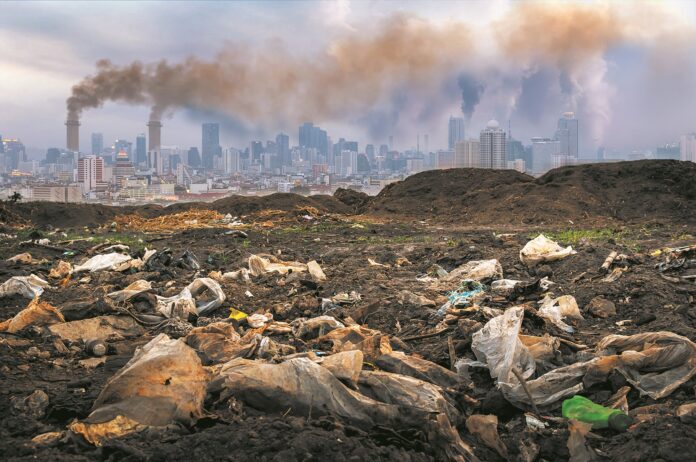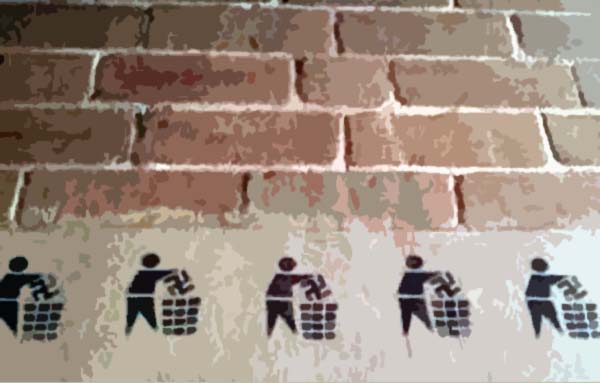Nigel Smith
This text is based on the speech made by comrade Nigel Smith at an event in Todmordon, England, organised by climate activist groups. Nigel was asked to speak as Vice Chair of Calderdale Trades Union Council.
According to New Scientist the population group that has the least insight into climate change, is the elite political and business class. A refusal to look at weaknesses in the system is inherent in this class. The Covid pandemic showed this on our TV screens, with politicians lying to us and forcing the experts to lie as well. What Boris Johnson and others did was try to make up excuses for the mistakes they were making because profit came before the well-being of the people. The same applies to the future of the planet – profit comes first – it has to under capitalism – it’s a rule inherent in the system itself.
***
One way in which the catastrophic character of the capitalist system reveals itself is the climate crisis. During the period when capitalists worldwide had some kind of cooperation under US hegemony, they could discuss measures to tackle the climate crisis (even though they were still completely inadequate). But fierce competition does not leave space for even basic policies of “green transition”. In fact, especially after the war in Ukraine, capitalists have backtracked in a number of crucial fields – thus there is a return to coal-powered energy production, which is the most harmful and was on track to be depleted, as well as to nuclear energy which is now branded as “green”. This does not mean that there will be a complete reversal of capitalist green policies. But they will be “too little and too late”. This was exemplified in the recent COP28. It’s another proof that capitalism is blindly leading the planet on a catastrophic course.
Therefore, the climate crisis is in this sense linked to the cost-of-living crisis. The war in Ukraine as part of the wider conflict for world domination leads to increasing burdens being imposed on ordinary people across the globe. The IMF inflicts its strictures on every country it ties to its neo-liber orthodoxy. Every crisis capitalism creates – whether the economic melt-down of 2007 / 2008, the war in Ukraine or the battle for world economic domination between the USA and China, leads to a reduction in living standards for the people. China for example was previously, especially following 2008, virtually the only country where living standards were actually improving. The picture today in China is of economic uncertainty, increasing unemployment and a housing problem – a housing bubble leading to vast numbers of empty properties as well as many people living in inadequate housing.
Blaming capitalism for this state of affairs is reasonable because it is the only show in town. Attempts to modify neo-liberalism have been met with ruthless opposition. Jeremy Corbyn’s attempt at a form of social democracy was crushed, not only by the neo-liberals in the Labour Party but also by the unremitting attacks of the BBC and capitalist press – including the Guardian. The attempt by SYRIZA to try to put some kind of break in austerity policies, was crushed by the EU with the SYRIZA government tamely capitulating, even though they had a significant popular mandate given to them by the Greek people via a referendum.
***
All over the world the story is even worse with inequality and poverty increasing virtually everywhere. In Sri Lanka, for example, poverty is being imposed on the people at the diktat of the IMF because balancing the books is seen as more important than the welfare of the people. Profit is wrenched from the masses and they starve. This is in a tropical country that can easily grow enough food to feed its population. Currently many Sri Lankan’s, including those in work, are subsisting on one meal a day and the same story is repeated on a global level.
In the UK we have numerous food banks and relatively high levels of poverty. Millions of people unable to heat their homes or feed their children adequately. We have a public health crisis, with 1 million children now living in absolute poverty. The policy of austerity continues and will continue under a Labour government. Austerity was after all the ex-Labour Prime Minister, Gordon Brown’s inspiration, in his plan to “rescue the world” from the economic crisis of 2007 / 2008. Labour councils have done little to oppose austerity – seeing themselves as simply better at distributing the reduced funding than the Tories – cherry-picking their pet projects at the cost of others.
***
The capitalist class has been putting on a similar front at its COP meetings. The latest one, COP 28, failing to fix any mandates on the participating countries.The Guardian described COP 28 as a “landmark”, but it was indeed a negative landmark.
Even the editorial described the final text as “stating the obvious” and that “the climate emergency needs better than this”. Far from hitting the current 1.5 degree target, UN projections ahead of the summit showed the likely temperature rise to be almost double that at 2.9 degrees.
The energy crisis, intensified by the war in Ukraine and the EU sanctions against Russia, has led to a frenzy of search and extraction of new sources of fossil fuels all over the world. The use of oil, gas and coal is expanding instead of being phased out, while scientists were warning that the situation was at a tipping point even before the war, the energy crisis and the mass shift back to coal.
***
Capitalism depends on a drive for ever-increasing profits. In order to do this, it demands more and more natural resources- and of course produces more and more waste. It creates a mass class of the exploited and an ever-shrinking elite – the exploiters. There is a middle class, which, along with the state machine – the army, police etc – serves to absorb pressuresfor any real or significant change, which might disrupt the comfort of the “haves”. Western, first world countries also ensure that developing countries remain in a state ripe for exploitation of cheap labour and raw materials. Poverty is therefore embedded in the system.
Capitalism cannot work without destroying the environment, and it cannot work without exploiting labour, creating poverty. That is the reason why the struggles against poverty and climate change have to be connected.
***
Last year in the UK, millions went on strike to win better pay and conditions. This action did win increases from the government, which would not have been achieved if the workers hadn’t gone on strike. However, these increases have, especially in the public sector, barely kept up with inflation and unless workers strike again their living standards will fall still further. The prices of the goods and services most important to ordinary people, food, heating, fuel etc have increased the most and thereby making poverty even more entrenched. Currently the Consumer Prices Index is at 7%, falling slightly from over 10% – keeping pay, at best on a plateau for some but declining in terms of purchasing power for many.
None of the capitalist parties has the resolve or policies to change the system enough to avoid climate catastrophe and increasing global poverty and that includes the Green Party.
The challenge for socialists is to convince people that it is possible to pursue green policies and provide substantial employment within a landscape of renewable resources. We face a system, whose leaders lack any sense of commitment to tackling climate change. The Labour Party’s abandonment of its already modest £28 billion climate pledge is testament to that, when they have no difficulty sanctioning £12 billion to continue the war in Ukraine, with no attempt at trying to secure a ceasefire because it doesn’t suit the USA’s global ambitions.
***
During the climate strikes which took place prior to Covid close links between young people and workers as well as between the Left and XR were being built. The trades council in York where I lived at the time and of which I was the secretary, played a key role for example, providing safe spaces for young people to discuss their ideas. We have been slow to rebuild these links since then. However, what the movement lacked was a political dimension and put too much faith in experts being able to persuade politicians of the best way forward on climate change. The experts spoke and those in positions of real power paid, at best, lip service to their protestations. They are putting up barriers to progress in order to protect profit. This is why a political alternative is necessary and activism alone will not suffice.
Below is a set of transitional ideas, that are realistic in our epoch and that could move us towards a better world, but which capitalism for the most part refuses to implement because they would be seen as getting in the way of maximum profitability.
- £15 per hour minimum wage and a universal basic income.
- Prioritising major research and investment into replacing fossil fuels and nuclear power with renewable energy and ending the problems of early and unrecycled waste and creating jobs.
- For a major, publicly funded, insulation and energy transition plan for existing housing stock.
- Nationalisation of the energy and water companies, under democratic workers’ control and management, in order to carry out a major switch to clean, green energy, and clean water, without any loss of jobs, pay or conditions. Subsidise energy costs for poorer households, so everyone can afford to stay warm.
- A democratically planned, massively expanded, free-to-use, publicly owned transport system, as part of an overall plan against environmental pollution and incentivise the use of public transport.
- An increased emphasis on small-scale localised energy projects.
- Commit to the production of manufactured goods that are built to last. Make built-in obsolescence illegal.
- Use AI to benefit the environment and not in the production of machines that will unnecessarily make more demands on the Earth’s resources.
- Move away from industrialised farming, growing better food, employing more workers and increasing bio-diversity. Free school meals to all children, including during school holidays and a subsidised price for fresh fruit, veg, meat, dairy and fish.
- Take the wealth off the super-rich! For a socialist government to take into public ownership the top 150 companies and the banking system that dominate the British economy, and run them under democratic working-class control and management.
These demands, especially the last one, may look like an idealist pipe-dream. But if we were to go back only four years, then the climate movement was raising the energy and determination for radical change, especially amongst the youth. What was lacking was a political dimension and the disunity of the Left did not help the situation. It is time that we realised that the old political class cannot save this situation and is propelling us yet further to more war and poverty. They have had almost exclusive control of the global economy since the fall of Stalinism, 35 years ago. Since then, the lives of most have got worse and poverty is increasingly entrenched.
Without a political alternative these demands will prove to fall on deaf ears – derided by those who control the real levers of power – the capitalist elite. That’s why we urgently need to built one!













